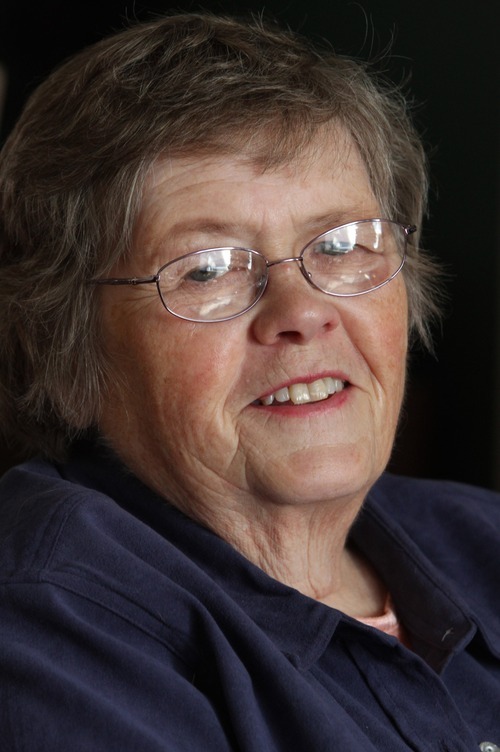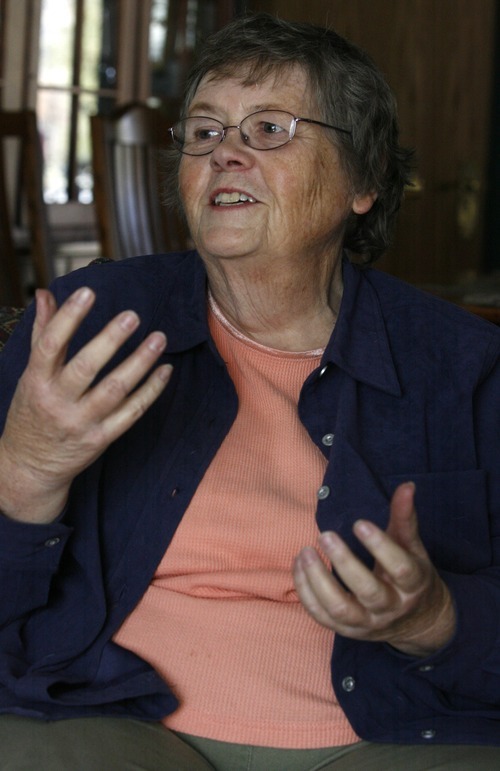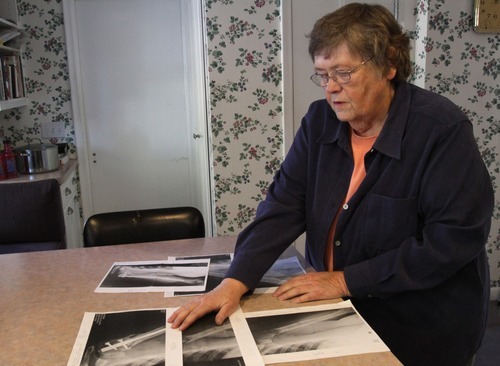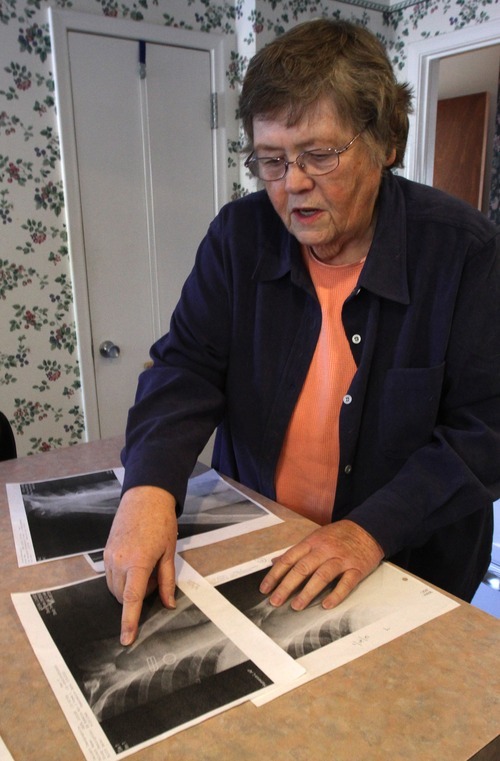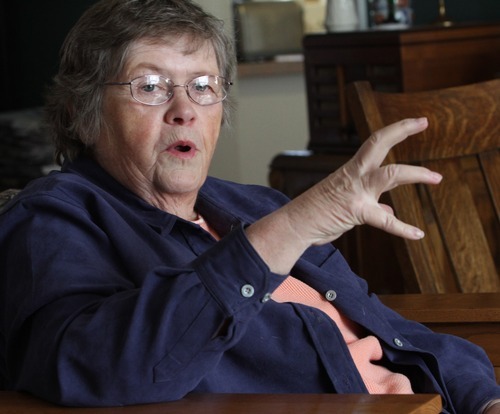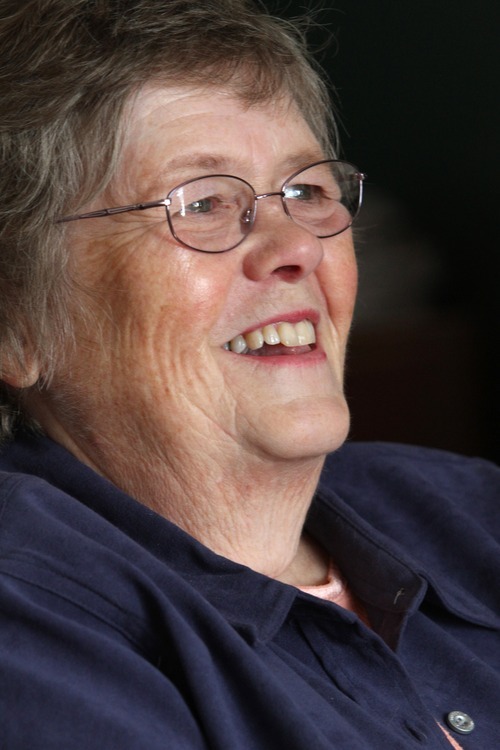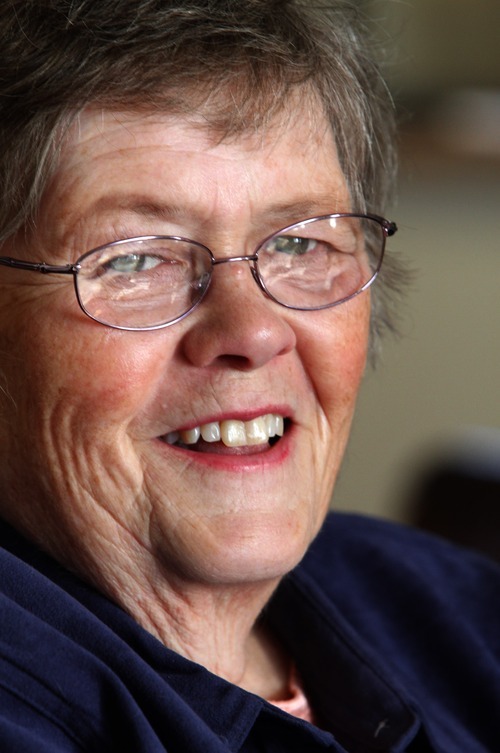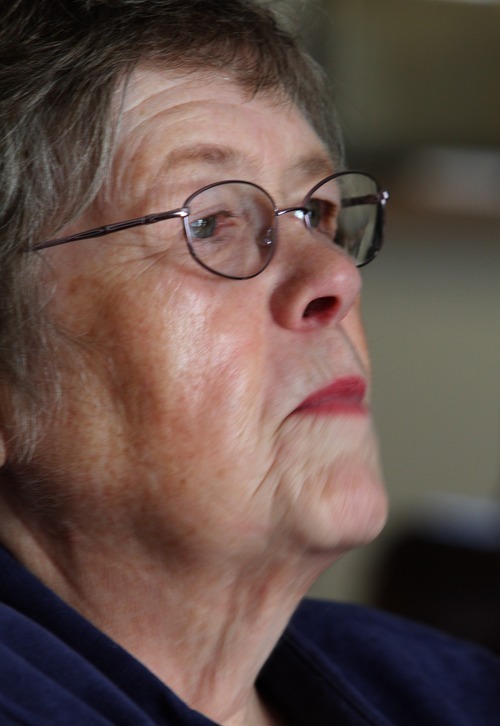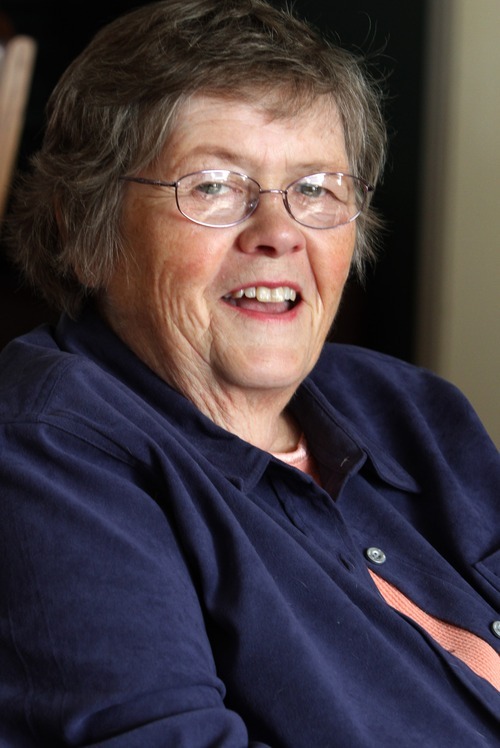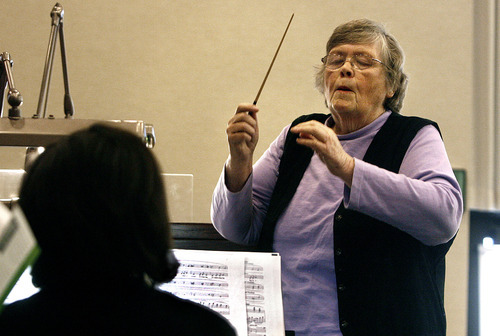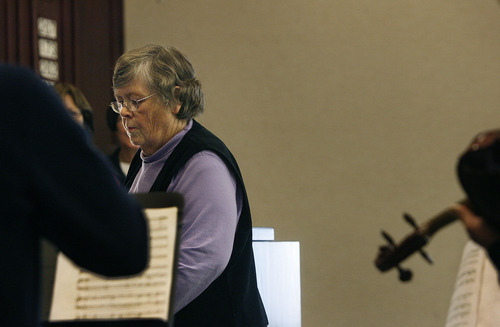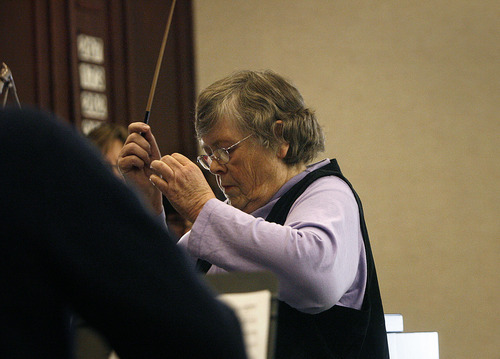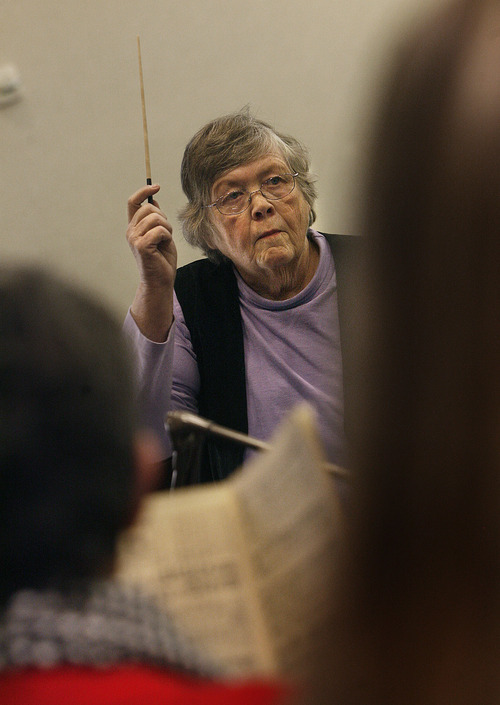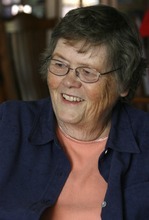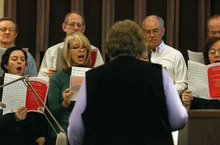This is an archived article that was published on sltrib.com in 2011, and information in the article may be outdated. It is provided only for personal research purposes and may not be reprinted.
Before metal rods were inserted in her arms, Louise Degn liked to bring her LDS ward choir to its final note with a strong, upbeat flourish. Now Degn must settle for using her baton in downward motion as a more subtle punctuation, with her arms lifted only halfway to her shoulders.
But she can still conduct the choir's traditional Christmas program Sunday, accompanied by a full orchestra, at the east-side Salt Lake City chapel.
Nothing could stop her from leading the hourlong musical service this year, concluding with scores of former ward members emerging from the congregation to join in the triumphant Hallelujah chorus. The chapel will be filled, as they say, with a "joyful noise."
Doctor-ordered chemotherapy for her bone cancer will have to wait.
"She has persisted in the face of seemingly insurmountable challenges — a bunch of amateurs and a deadly disease," says Jack Ashton, a violist with the Utah Symphony who assembled the orchestra. "She has never complained or lost heart. It's good for us to see."
Degn has spent a life and career navigating around obstacles. She is known as a fearless journalist, working for a time as the only woman in Salt Lake City's broadcast news. She has written and produced hard-hitting documentaries on controversial topics. And she spent the past two decades as a journalism professor at the University of Utah, pushing her students to read critically, analyze deeply and critique thoroughly the issues and assumptions in their world.
She approached her media work like a classically trained musician — with discipline, devotion and delight.
She still does.
—
Start out pianissimo • Growing up in Ogden, Degn had two passions: music and news.
Young Louise started piano lessons at 8, practicing on her grandmother's grand piano in the living room. She learned conducting in sixth grade and spent hours leading an imaginary choir in her living room to the sounds of Ray Conniff's band on the record player. She developed a strong sense of rhythm and beats from playing the bells in Ogden High's marching band.
Degn's fascination for news began in 1956, when the 10-year-old sat transfixed in front of the television late into the night, watching the Democratic and Republican conventions for the presidential election between Dwight Eisenhower and Adlai Stevenson.
In 1960, Nancy Dickerson became among the first women to break into the all-male enclave of American broadcast journalism, and Degn wrote her a fan letter.
The famed journalist answered her query with strong advice: Study political science, history, economics, geography or any intellectual pursuit that will help you understand and report on the world.
So that's what Degn did.
The would-be journalist first earned a degree in political science at Utah State University — with a minor in music, of course — then ventured out of Utah's cocoon to get an advanced degree in communication from Northwestern University in Evanston, Ill. It was a rigorous program with top-notch students, and Degn threw herself into it. Soon she was covering a union protest in a tough Chicago neighborhood and thriving on adrenalin.
Still, a Northwestern adviser urged her to write for newspapers, warning Degn that TV stations "don't hire blacks or women, so don't waste your time."
Luckily, the FCC was pushing stations to diversify and KSL-TV complied. Degn got her first job.
—
Pick up the tempo • The cub reporter, required to wear skirts at all times, first arrived at KSL in 1969, when University of Utah students joined others in protesting the Vietnam War. Cameraman in tow, Degn filmed the sit-ins and student activism. Some viewers were not pleased.
"It was so unusual for Utahns to see their children protesting," Degn says. "I got many angry phone calls calling me anti-American, saying how dare I put those kinds of people on television."
She also reported on the 1970 lawsuit against The Church of Jesus Christ of Latter-day Saints for its plans to tear down the Coalville Tabernacle, a beloved historic building. When the judge ruled against the critics, the church demolished the building that same night.
Degn and her cameras were there to record the astonished and demoralized protesters. Again there were howls of complaint, some from LDS headquarters. But Degn, herself an LDS returned missionary, persisted.
She and a photographer flew in a small plane into the water-drenched towns of eastern Idaho after the Teton Dam broke, landing in a corn field, interviewing witnesses standing knee-deep in water, and returning to Salt Lake City in time for the 10 p.m. newscast.
But Degn may be most remembered for her ground-breaking 1979 special, "Mormon Women and Depression."
In it, Degn, who wrote, produced and narrated the one-hour documentary, interviewed LDS women who had struggled with depression and felt guilty or ashamed of it. She talked to mental health professionals and to church leaders to discuss the problem. She explained that depression was real and yet unspeakable in church settings. The show was replayed and discussed endlessly, winning Degn both awards and respect across the nation.
Facing issues with honesty continued to be one of Degn's strengths.
—
The big C • Degn's first personal experience with cancer arrived in 2008 when a mammogram revealed a lump in her breast. She had a lumpectomy to remove the mass as well as seven lymph nodes in her arms. Radiation treatments followed. It wasn't too bad.
"It sometimes felt like a bad sunburn, but that's all," Degn says, "At the same time, I had a knee replacement and [pain from] that was much worse."
Doctors then tested the edges of Degn's lymph nodes to see how far it had spread and declared her cancer free.
A year later, Degn was reaching over her shoulder to button a shirt when a sharp pain shot up her arm. She presumed a pulled muscle and went to see her doctor.
"I still remember his face as he stared at the X-rays. A series of black dots all up and down my arms were clearly visible," she says. "The cancer had metastasized. He was surprised that my arms hadn't broken since there was no bone there."
Two months later, they did.
Doctors inserted the metal rods to stabilize her arms. They told her that bone cancer is 100 percent fatal, she says matter-of-factly, with an average life span after diagnosis of about three years. It's been two and a half.
After the surgery, Degn had to give up the choir for a spell, but her bishop refused to "release" her from the position.
The Foothill 7th LDS Ward has a long musical traditional and steep talent pool including members of the Mormon Tabernacle Choir, Utah Symphony, soloists in university music programs and even neighbors of other faiths.
And all of them appreciate Degn's gifts and quiet, no-nonsense approach to conducting.
"She's not your typical choir director," says Mark Garfield, who sings tenor. "She's quirky, with a jazzy ear. She can pick up subtle nuances in the music."
Degn also is unafraid to call people out for a less-then-perfect performance.
"She knows when I'm not singing on pitch or singing too loud," Garfield says, "and has the guts to tell me."
Liz Warner, the choir's previous director, notes the small ways Degn has adapted to her condition.
"When one of her arms couldn't get high enough, she'd use the other one to give it a little push," Warner says after Saturday's morning rehearsal. "She didn't make a big deal about it. Just did it."
—
Hold that note • Whether Degn has six months or six years left is irrelevant to her.
"I don't have any great wisdom to offer my friends," she says with a shrug. "You just march forward."
You keep trying each new cancer therapy until it stops working, Degn says. Then you try the next one and the next one until there is nothing left. Then you die.
The cancer diagnosis, though, has sparked a new determination to live more richly and deepen relationships with those around her.
At her LDS ward, for example, Degn has made it her goal to talk to a new young couple every week, longtime friend Marie Cornwall says.
"Louise has always been grounded. The only difference now is that she's more intense about life and connecting with other people," Cornwall said.
But don't call her courageous, says Degn, who has been single all her life. That's for caregivers, such as siblings, nieces, nephews, and friends who go with her on the journey and then live with the loss.
Until then, the quietly powerful journalist will keep leading her choir.
"When you conduct, the music goes through your whole body," she says. "It energizes me."
Degn will happily keep doing it — until she can't.
Louise Degn
Louise Degn, born in Logan and raised in Ogden, earned her bachelor's degree in political science from Utah State University, her master's degree from Northwestern University.
Her KSL-TV career ran from 1969 to 1990, with a two-year interruption to work at a Chicago station.
She has taught journalism at the University of Utah since 1990 and plans to retire this spring.


